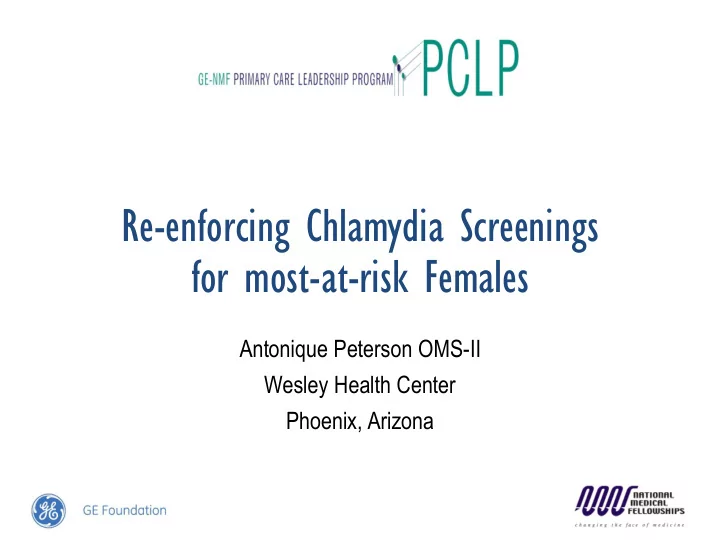

Re-enforcing Chlamydia Screenings for most-at-risk Females Antonique Peterson OMS-II Wesley Health Center Phoenix, Arizona
Introduction • Chlamydia is the most common STI in the United States • Often times, chlamydia is asymptomatic • Left untreated, it may cause serious health concerns with the reproductive system • Most-at-risk females are between the ages 14-25 • The CDC recommends that most-at-risk females be screened yearly • According to CDC, Phoenix recorded rate of chlamydia is 4.78%
Background • Chlamydia screening audit was pulled in June 2014 • Females • Born between 1/1/1989 & 12/31/1999 • Visitors to WHC between 1/1/2014 & 3/31/2014 • 171 patients • 34 patients screened during visit • 20% screening rate • WHY?
Methodology & Results • Week 1 • Checked patient’s charts for screening within yearly period • 171 patients • 58 were not screened, including 1 patient refusal • 66% screening rate
Methodology & Results • Week 2 • Checked patient’s charts for visit type • 171 patients • 113 screened • 58 not screened • 44 provider visits • 12 lab visits • 1 mental health visit • 1 patient refusal • 66% screening rate
Methodology & Results • Week 3 & 4 • Checked patient’s charts for providers seen during visit
Methodology & Results • Week 3 & 4 • Checked patient’s charts for reason for visit
Methodology & Results • Week 5 • Prenatal audit • All ages • Prenatal visits between 7/7/2014 & 8/1/2014 • 22 patients • 91% screening rate
Methodology & Results • Week 6 • New chlamydia audit • Females • Born between 1/1/1989 & 12/31/1999 • Visitors to WHC between 7/7/2014 & 8/8/2014 • 74 patients • 1 patient refusal • 75% screening rate
Discussion • Original audit screening rate 20% • After re-evaluation 66% • Most recent audit 75% • Screenings are important because chlamydia infection rates are rising yearly
Recommendations • Make sure the most-at-risk females are screened • Discuss protocol for collecting samples between medical staff and providers • Regularly compile audits and evaluate results • Educate the public
Conclusion • Overall screening rates have increased • Still room for improvement • Screenings are important to reduce the spread of infection • To promote overall health of the community, WHC should continue to conduct routine chlamydia screenings
Acknowledgements • Kathleen Brite, MD • Katherine Chuang, MD • Emma Viera, PhD, MPH • Elizabeth Thorley • Wesley medical staff
Recommend
More recommend